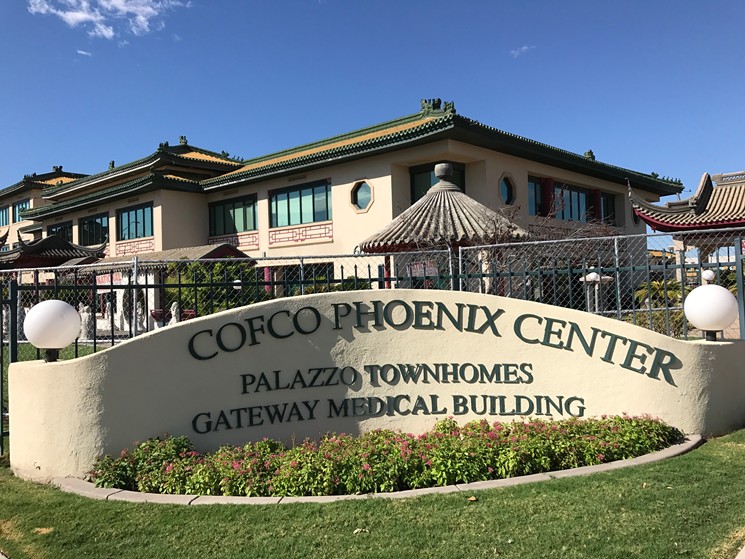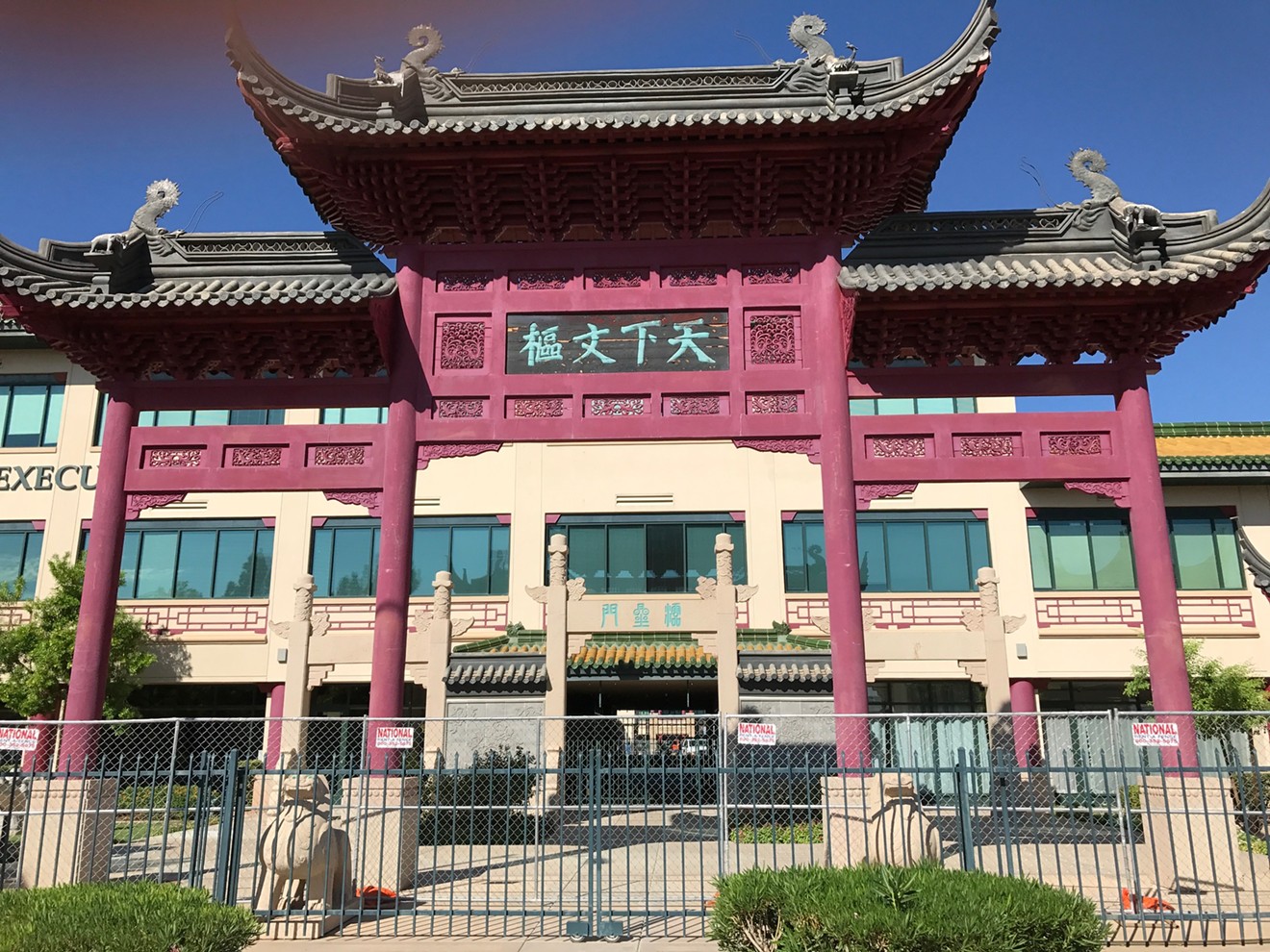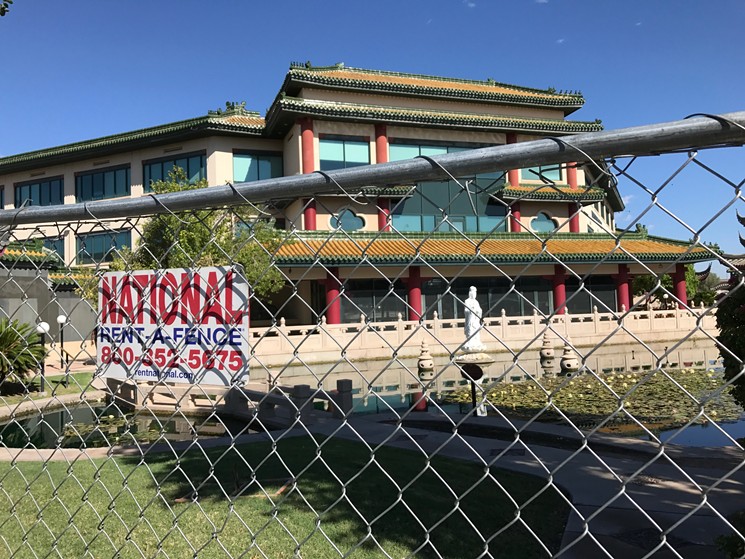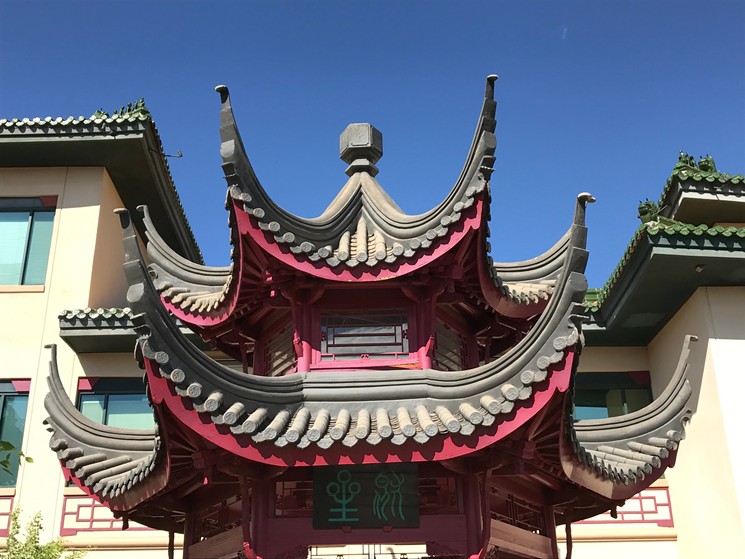On Tuesday, September 12, the Phoenix City Council agreed to undertake a cultural survey that Chinese Cultural Center advocates hope will help make a case for historic preservation. Later that week, a Chinese-American-owned business still located on the site filed a lawsuit aimed at stopping changes to the center.
Located on 44th Street just north of Van Buren Street, the now-defunct Chinese Cultural Center site is set to become the headquarters for True North, a Scottsdale-based private equity firm. One of its subsidiaries, a company called 668 North, purchased the Center's property in June for $10.5 million.
That means major changes are coming to the site, which had served as the city's sole Chinese Cultural Center since it was built in 1997 by a real estate firm called BNU Corporation. That's a subsidiary of China National Cereals, Oils and Foodstuffs Corporation (COFCO), a business owned by the Chinese government.
The former center includes 165,000 square feet of building space with Chinese-style architecture, created with the help of several master artisans based in China who obtained special visas to travel to Phoenix and participate in the project. The site also includes extensive gardens, complete with a koi pond and several stone statues of Chinese figures. The degree to which various elements are being preserved by the new owners is unclear at this point.Members of the metro Phoenix Chinese American community are concerned the change in ownership will result in wiping the site clean of Chinese design and culture.
tweet this
As a commercial enterprise, the Chinese Cultural Center was never directly funded by the city, and no public art money went toward creating it, says Gail Browne, executive director for the Phoenix Office of Arts and Culture. (The city does help fund Phoenix Chinese Week, an annual celebration of Chinese culture held at the center from 2001 to 2013. In 2014, the event moved to Hance Park and has continued annually.)
The buildings at the former center's complex have primarily housed retail businesses and offices through the years, including some owned by Chinese-Americans. One main tenant, Super L Ranch Market, left the site when notified by the new owner that its lease had expired, and is getting ready to open at a new location in Scottsdale.

Some signage at the one-time Chinese Cultural Center site still retains the COFCO name.
Lynn Trimble
True North subsidiary 668 North purchased the site from New York-based investment firm Angelo Gordon, which acquired the site from COFCO in 2016, according to a True North representative who spoke with New Times on Wednesday, September 13.
Members of the metro Phoenix Chinese-American community are concerned the change in ownership will result in wiping the site clean of Chinese design and culture.
They've tried different approaches to saving the site, including holding public protests at the former Chinese Cultural Center. On Friday, September 15, protesters gathered outside True North headquarters in Scottsdale.
Chandler resident Raymond Tang submitted a petition to the Phoenix City Council during its Wednesday, August 30, meeting. Tang is president of the Chinese United Association of Phoenix.
But the City Council voted to deny the petition during a policy session on Tuesday, September 12. Council members stated that private-property rights preclude them from requiring the new owner to preserve the center.
Visible changes are already underway, including the removal of some Chinese Cultural Center signage.
Last week, the new owners fenced off portions of the property, but explained via press release that it's merely a safety measure "while tenant improvements and other work is undertaken," rather than a prelude to future demolition. No demolition permits were on file with the city of Phoenix as of late afternoon on Friday, September 15.
Several members of the Chinese-American community in metro Phoenix want the Chinese Cultural Center, including existing buildings and extensive gardens, preserved. Several elements are replicas of significant Chinese landmarks, says Elizabeth Mann, who helped develop the center while head of BNU Corporation.
Advocates for preserving the Chinese Cultural Center say the buildings and gardens have historical and culture significance. Architect Ye Juhua has sent several letters to the Phoenix City Council, explaining the significance of various materials and design elements. Ye designed the Chinese Cultural Center, and helped create a Ming-style garden for the Metropolitan Museum of Art in New York.
Dozens of Chinese-Americans spoke in support of preserving the center during last week's Phoenix City Council policy session.
Mann talked about the rare materials used to build the center, and the Chinese master artisans who traveled to build it. For example, the center includes a type of stone used for the Forbidden City, an imperial palace built during the 15th century for members of the Ming dynasty.
There’s also an online petition, created by Jennifer Yang of Gilbert on Change.org. As of Monday, September 18, it had more than 16,000 signatures from people who want the center preserved.
Advocates are holding out hope that the Center might still be saved.
Some have retained attorney Paul Gilbert of the Phoenix law firm Beus Gilbert, who says his clients will continue to press for preservation. They’ve offered to fund a survey that would address the Chinese Cultural Center's historic and cultural context.
During its recent policy meeting, the council approved the city undertaking such a survey. Advocates hope the results will show that the center should qualify for historic preservation, despite that fact that it’s just 20 years old.
Typically, buildings have to be at least 50 years old before they can be considered for historic designation, says Michelle Dodds, historic preservation officer for the City of Phoenix.
But buildings can sometimes qualify due to their special significance, she says. Conducting the survey is the first step toward providing the historical and culture context the city would need to evaluate whether the center might qualify using that criteria.
The survey will likely take six months, Dodds says. That's before a formal review process could even begin.
Even then, the odds aren't good. Only two Phoenix properties less than 50 years old have been given a historic designation.
One is the building previously known as the Good Shepherd Home for Girls located near 19th and Northern avenues, which was built around 1942 and placed on the Phoenix Historic Property Register in 1988. The other is Santa Rita Hall, built around 1962 near 10th Street north of Buckeye Road. That made the list in 2007, because of a historic 1972 fast undertaken there by Chicano activist Cesar Chavez.
"The criteria are really tough," Dodds says. "To really have control over a property, you have to own it."
Essentially, the company 668 North is free to make any changes not prohibited by zoning laws or stipulations in the original site plan for the Chinese Cultural Center.
Despite advocate concerns that 668 North could demolish buildings or gardens before that survey is completed, a company representative told New Times in an email on Wednesday, September 13, that they have no plans to do so.
"We have already announced preservation of the garden," he wrote. "There will be no demolition of buildings, only remodeling and relocation per previous press releases."
In a release issued on Tuesday, September 12, 668 North outlined several options for retaining or relocating particular elements of the center."It's so hard to build something," Elizabeth Mann says, "but so easy to destroy it."
tweet this
They include preserving a block-long garden along 44th Street for the foreseeable future, and making it available to the public during normal business hours. The release also states that 668 North is willing to preserve and relocate certain elements, such as sculptures and a 30-foot-high welcome gate.
They've also offered to provide up to 8,000 square feet of retail space for a nonprofit organization to operate a community cultural center on the site, and donate $100,000 toward the planning or creation of a new Chinese Cultural Center in Hance Park.
Neither the city nor other groups have announced plans to build a new Chinese Cultural Center. And advocates, who want the Center to remain intact at its current location, are concerned that moving architectural and design elements could cause irreparable damage.
Some Chinese Cultural Center supporters are turning to the courts, rather than the historical preservation process.
On Friday, September 15, attorneys for CJ Design & Construction filed a lawsuit against 668 North, as well as True North CEO David Tedesco and his wife, Gemma Tedesco. CJ Design operates the Szechwan Palace restaurant located at the former Chinese Cultural Center, and its lawyers say the company owns rather than leases its space there.
CJ Design is represented by a trio of attorneys at Wilenchik and Bartness, a Phoenix-based law firm whose other clients include former Maricopa County sheriff Joe Arpaio. The firm also filed for a temporary restraining order on Friday, and got a judge to rule that 668 North can't remove roof tiles or the center's main sign at this point. Another hearing is scheduled for Friday, September 22.
Meanwhile, 668 North is moving forward with plans to create a new headquarters on the site, where it will relocate about 350 employees.
For those hoping to preserve the center, it's a disappointing turn of events.
"It's so hard to build something," Mann says, "but so easy to destroy it."














